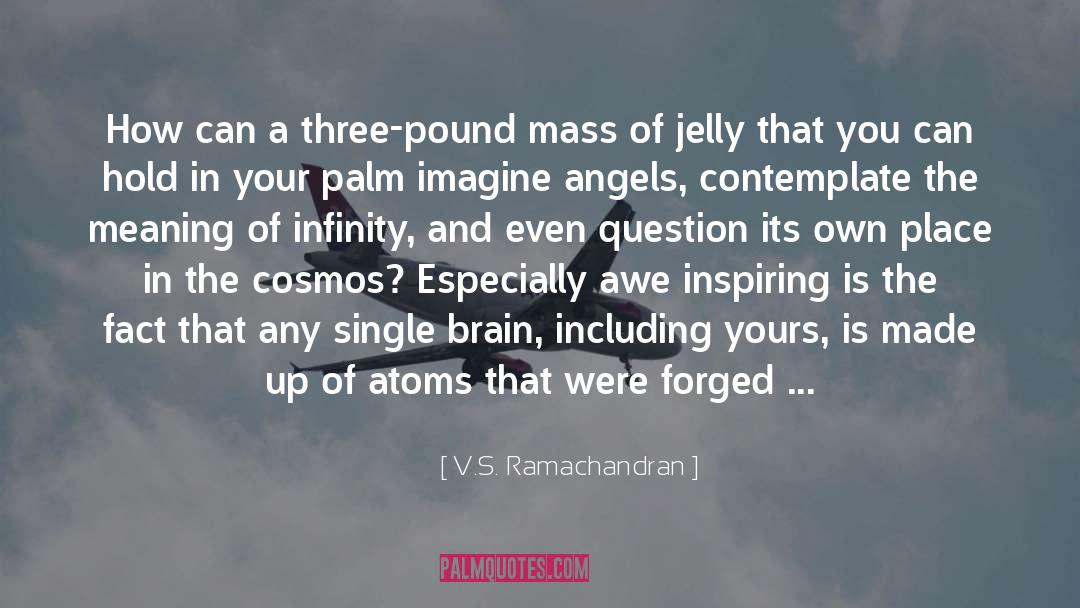V.S. Ramachandran Famous Quotes
Reading V.S. Ramachandran quotes, download and share images of famous quotes by V.S. Ramachandran. Righ click to see or save pictures of V.S. Ramachandran quotes that you can use as your wallpaper for free.
Once the propagation mechanism was in place, it would have exerted selective pressure to make some outliers in the population more innovative. This is because innovations would only be valuable if they spread rapidly. In this respect, we could say mirror neurons served the same role in early hominin evolution as the Internet, Wikipedia, and blogging do today. Once the cascade was set in motion, there was no turning back from the path to humanity.
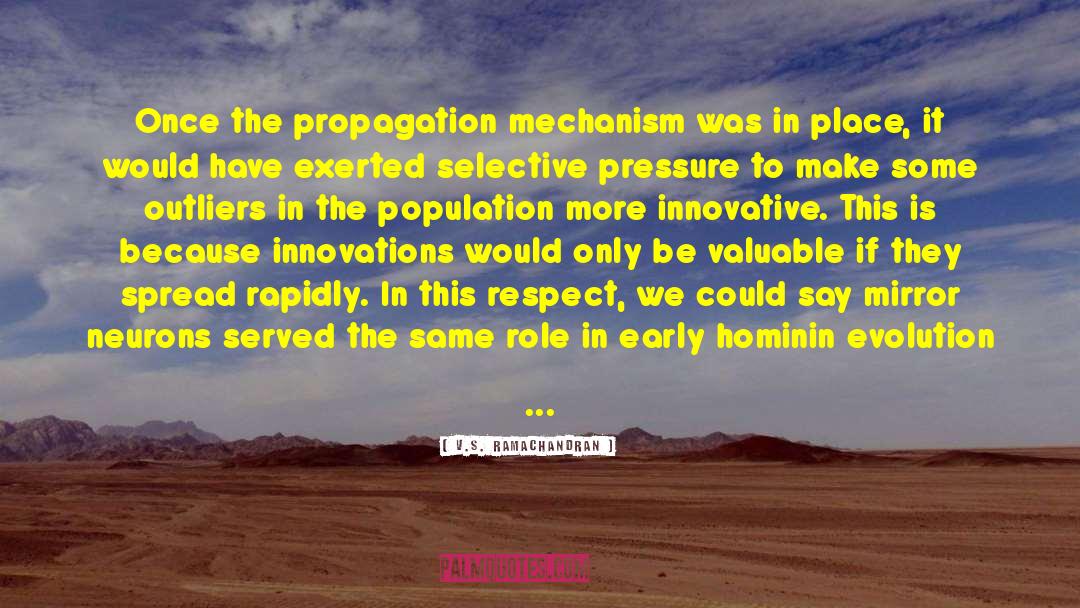
He had the arrogance of the believer, but none of the humility of the deeply religious.

The purpose of all of this (left hemisphere's way of choosing denial or repression over considering an anomaly) is to impose stability on behavior and to prevent vacillation because indecisiveness doesn't serve any purpose. Any decision, so long as it is probably correct, is better than no decision at all. A perpetually fickle general will never win a war.

So here is the greatest irony of all: that the self that almost by definition is entirely private is to significant extent a social construct.
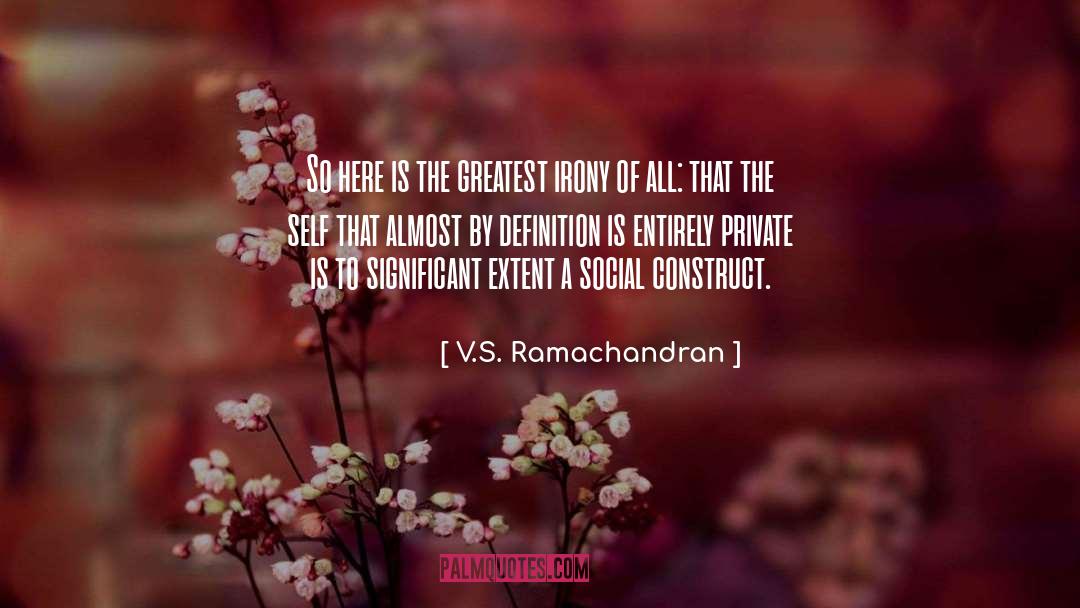
Despite all their surface diversity, most jokes and funny incidents have the following logical structure: Typically you lead the listener along a garden path of expectation, slowly building up tension. At the very end, you introduce an unexpected twist that entails a complete reinterpretation of all the preceding data, and moreover, it's critical that the new interpretation, though wholly unexpected, makes as much "sense" of the entire set of facts as did the originally "expected" interpretation.
In this regard, jokes have much in common with scientific creativity, with what Thomas Kuhn calls a "paradigm shift" in response to a single "anomaly." (It's probably not coincidence that many of the most creative scientists have a great sense of humor.) Of course, the anomaly in the joke is the traditional punch line and the joke is "funny" only if the listener gets the punch line by seeing in a flash of insight how a completely new interpretation of the same set of facts can incorporate the anomalous ending.
The longer and more tortuous the garden path of expectation, the "funnier" the punch line when finally delivered.
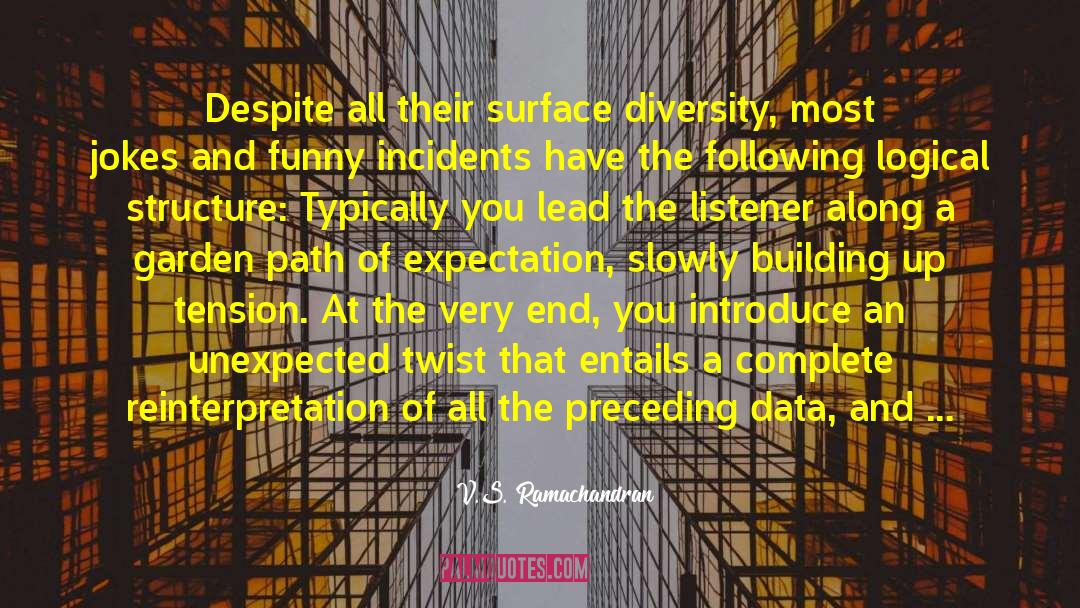
I found myself drawn to biology, with all its frustrating yet fascinating complexities. When I was twelve, I remember reading about axolotls, which are basically a species of salamander that has evolved to remain permanently in the aquatic larval stage. They manage to keep their gills (rather than trading them in for lungs, like salamanders or frogs) by shutting down metamorphosis and becoming sexually mature in the water. I was completely flabbergasted when I read that by simply giving these creatures the "metamorphosis hormone" (thyroid extract) you could make the axolotl revert back into the extinct, land-dwelling, gill-less adult ancestor that it had evolved from. You could go back in time, resurrecting a prehistoric animal that no longer exists anywhere on Earth. I also knew that for some mysterious reason adult salamanders don't regenerate amputated legs but the tadpoles do. My curiosity took me one step further, to the question of whether an axolotl - which is, after all, an "adult tadpole" - would retain its ability to regenerate a lost leg just as a modern frog tadpole does. And how many other axolotl-like beings exist on Earth, I wondered, that could be restored to their ancestral forms by simply giving them hormones? Could humans - who are after all apes that have evolved to retain many juvenile qualities - be made to revert to an ancestral form, perhaps something resembling Homo erectus, using the appropriate cocktail of hormones? My mind reeled out a stream of qu
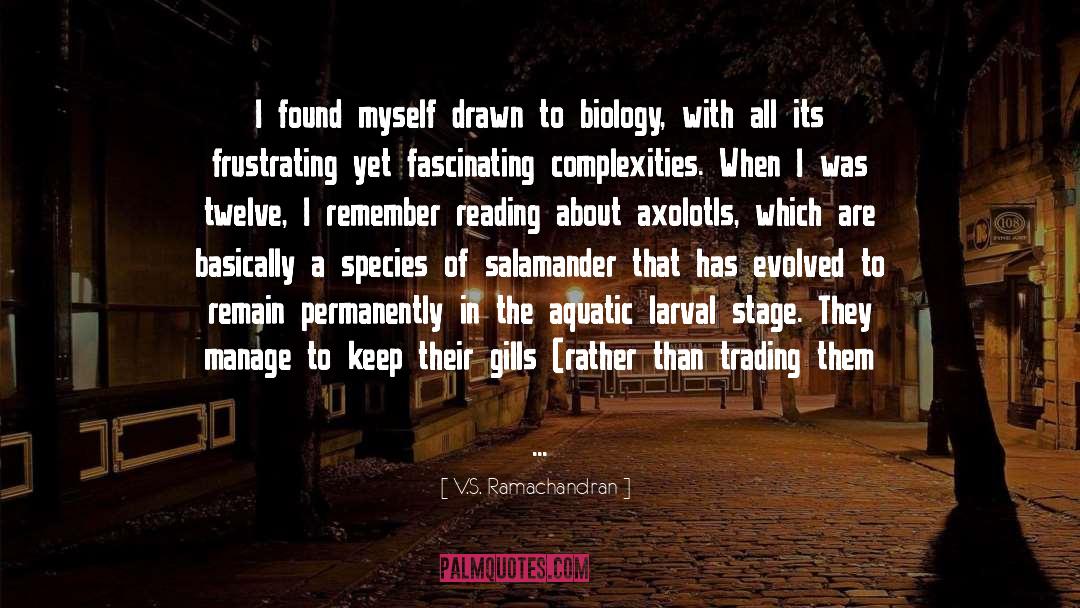
Even though its common knowledge these days, it never ceases to amaze me that all the richness of our mental life - all our feelings, our emotions, our thoughts, our ambitions, our love life, our religious sentiments and even what each of us regards us his own intimate private self - is simply the activity of these little specks of jelly in your head, in your brain. There is nothing else.

Yet as human beings we have to accept-with humility-that the question of ultimate origins will always remain with us, no matter how deeply we understand the brain and the cosmos that it creates.
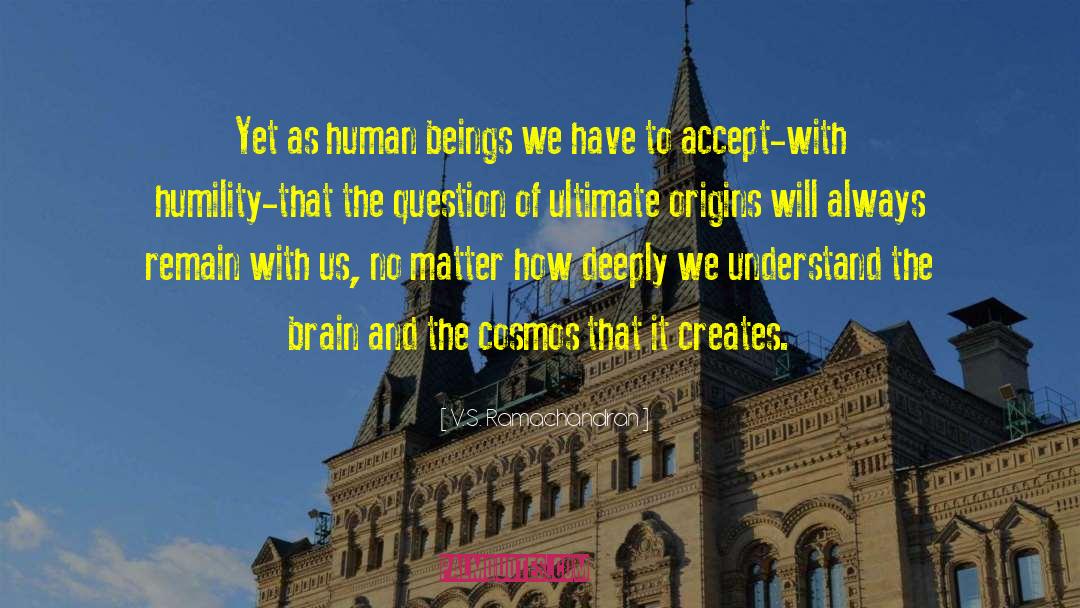
The common denominator of all jokes is a path of expectation that is diverted by an unexpected twist necessitating a complete reinterpretation of all the previous facts - the punch-line…Reinterpretation alone is insufficient. The new model must be inconsequential. For example, a portly gentleman walking toward his car slips on a banana peel and falls. If he breaks his head and blood spills out, obviously you are not going to laugh. You are going to rush to the telephone and call an ambulance. But if he simply wipes off the goo from his face, looks around him, and then gets up, you start laughing. The reason is, I suggest, because now you know it's inconsequential, no real harm has been done. I would argue that laughter is nature's way of signaling that "it's a false alarm." Why is this useful from an evolutionary standpoint? I suggest that the rhythmic staccato sound of laughter evolved to inform our kin who share our genes; don't waste your precious resources on this situation; it's a false alarm. Laughter is nature's OK signal.
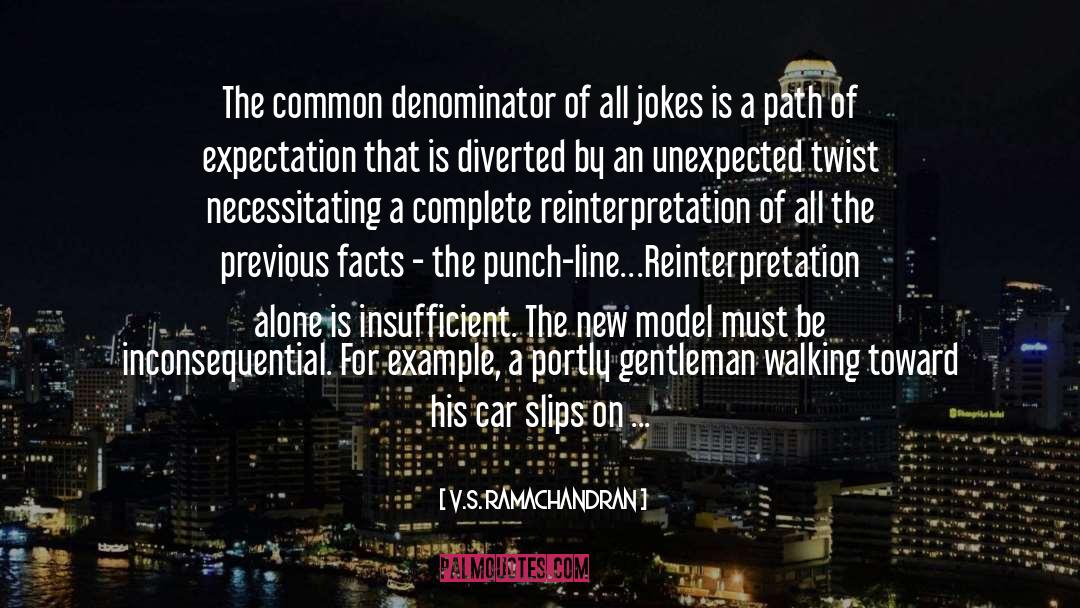
The law of perceptual problem solving, or peekaboo, should now make more sense. It may have evolved to ensure that the search for visual solutions is inherently pleasurable rather than frustrating, so that you don't give up too easily.
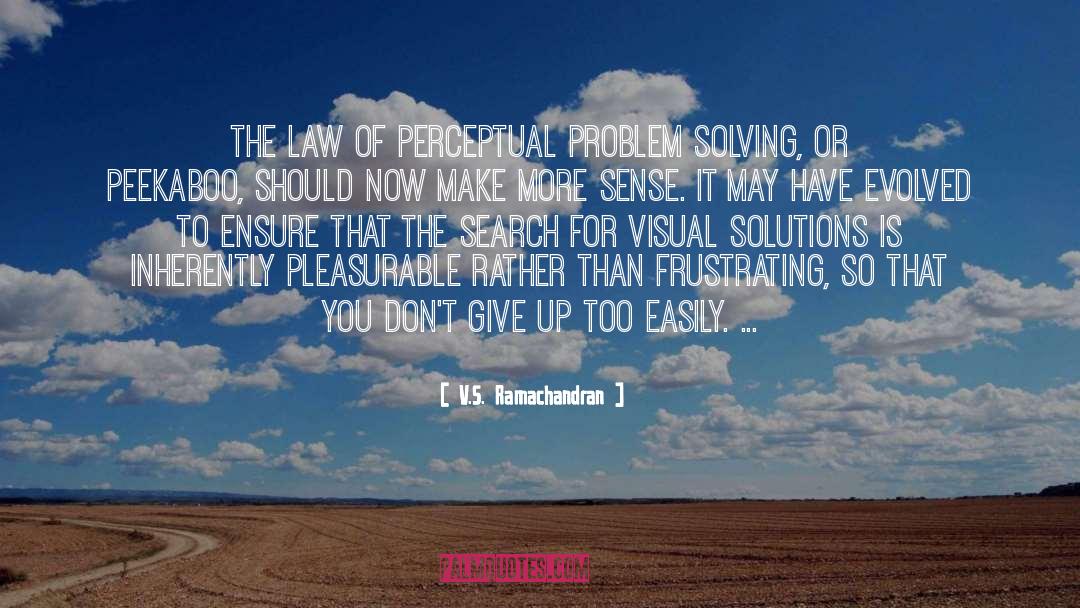
Indeed, the line between perceiving and hallucinating is not as crisp as we like to think. In a sense, when we look at the world, we are hallucinating all the time. One could almost regard perception as the act of choosing the one hallucination that best fits the incoming data.
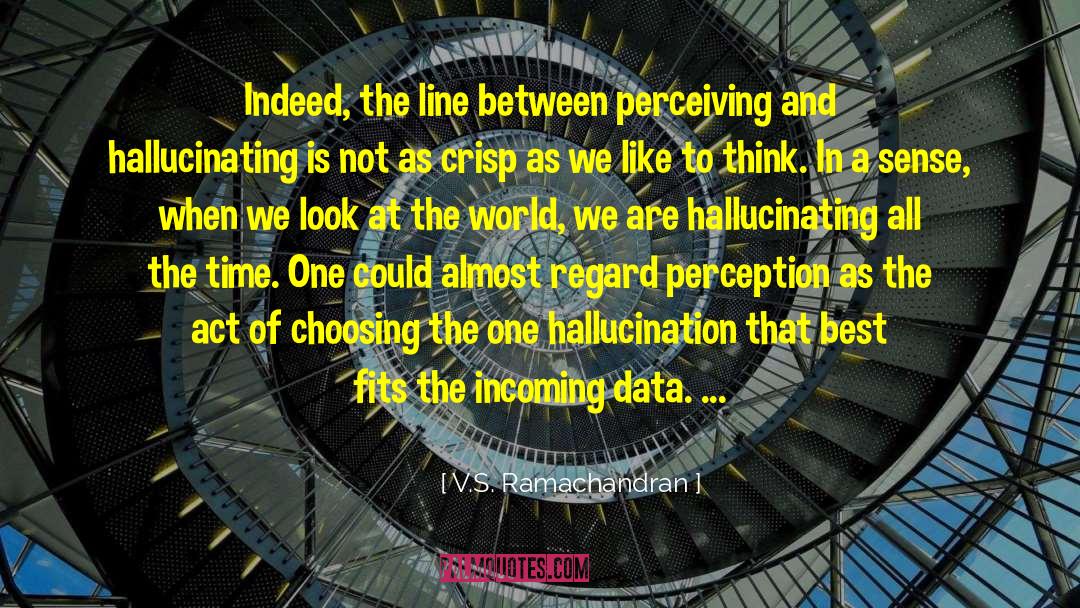
How does language interact with thought? Does language enable us to think, or does thinking enable us to talk? Can we think in a sophisticated manner without silent internal speech? And lastly, how did this extraordinarily complex, multicomponent system originally come into existence in our hominin ancestors?
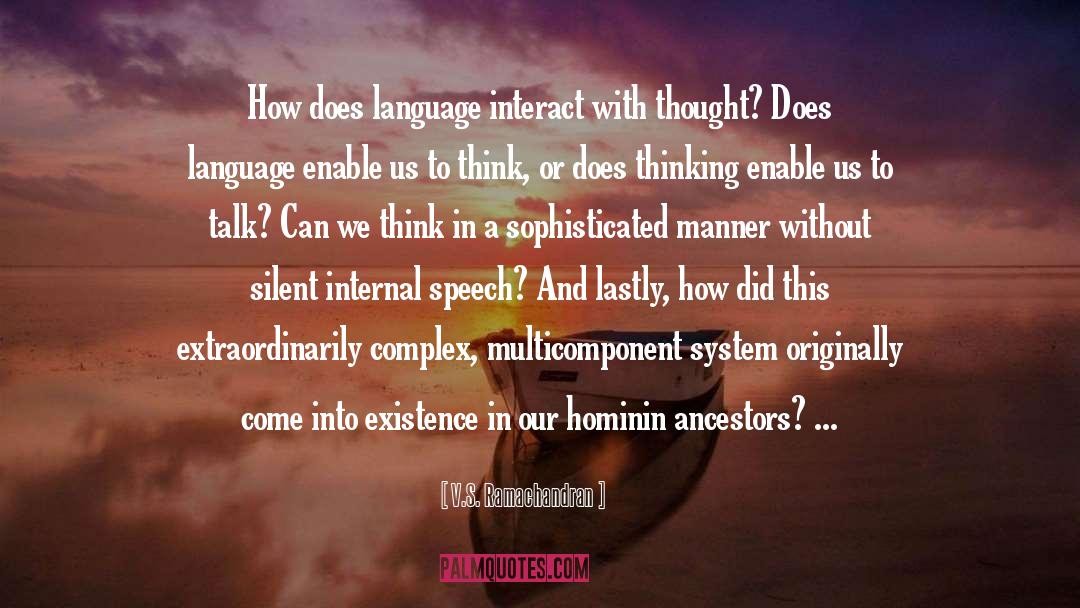
One of the first things we teach medical students is to listen to the patient by taking a careful medical history. Ninety percent of the time, you can arrive at an uncannily accurate diagnosis by paying close attention, using physical examination and sophisticated lab test to confirm your hunch (and to increase the bill to the insurance company).

Art can be thought of as a form of visual foreplay before the climax.

The real drive to understand the self, though, comes not from the need to develop treatments, but from a more deep-seated urge that we all share: the desire to understand ourselves. Once self-awareness emerged through evolution, it was inevitable that an organism would ask, ― Who am I? Across vast stretches of inhospitable space and immeasurable time, there suddenly emerged a person called Me or I. Where does this person come from? Why here? Why now? You, who are made of star-dust, are now standing on a cliff, gazing at the starlit sky pondering your own origins and your place in the cosmos.
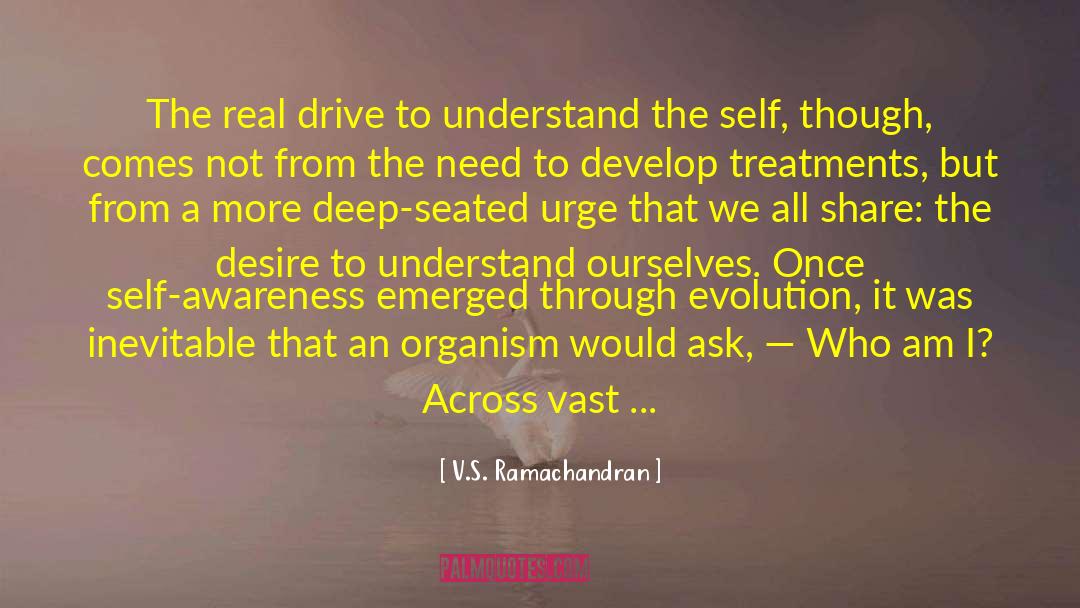
The TELL-TALE BRAIN A Neuroscientist's Quest for What Makes Us Human V. S. RAMACHANDRAN
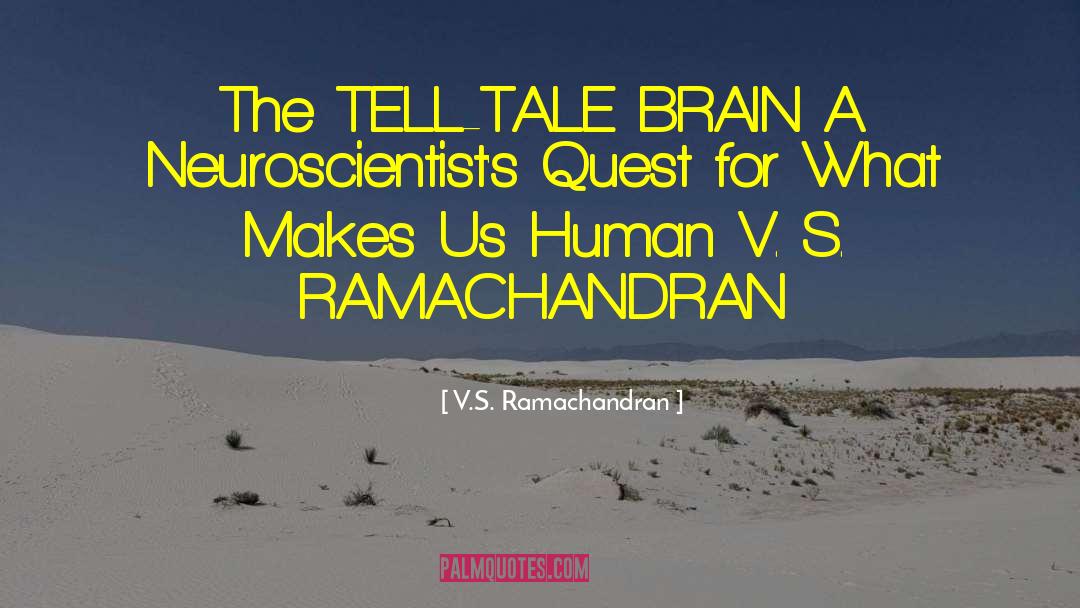
Any ape can reach for a banana, but only humans can reach for the stars.
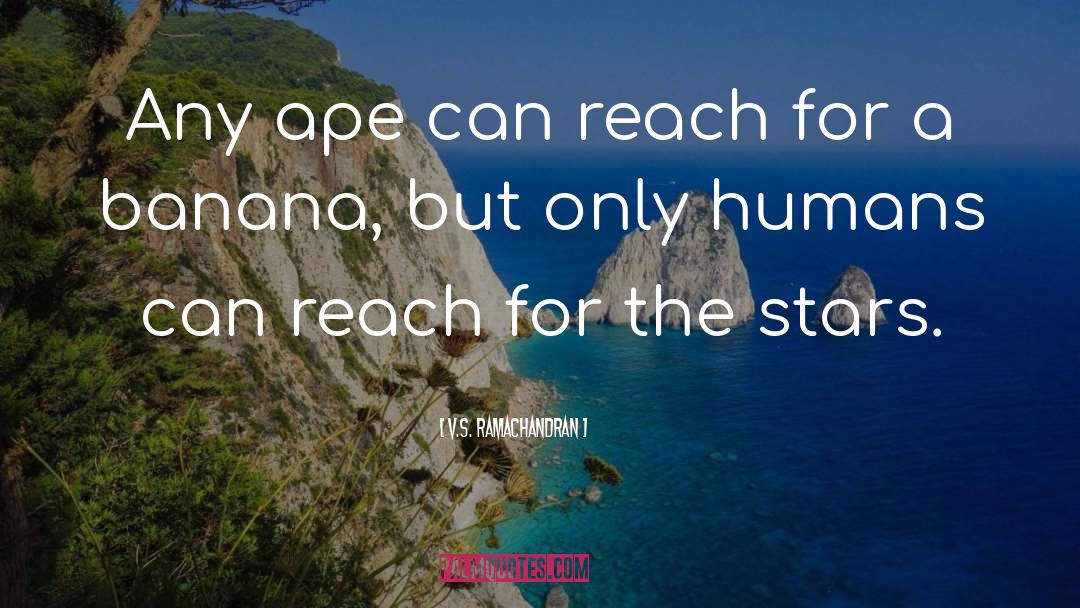
I learned an important lesson: Never take the obvious for granted. Once upon a time, it was so obvious that a four-pound rock would plummet earthward twice as fast as a two-pound rock that no one ever bothered to test it. That is, until Galileo Galilei came along and took ten minutes to perform an elegantly simple experiment that yielded a counterintuitive result and changed the course of history.
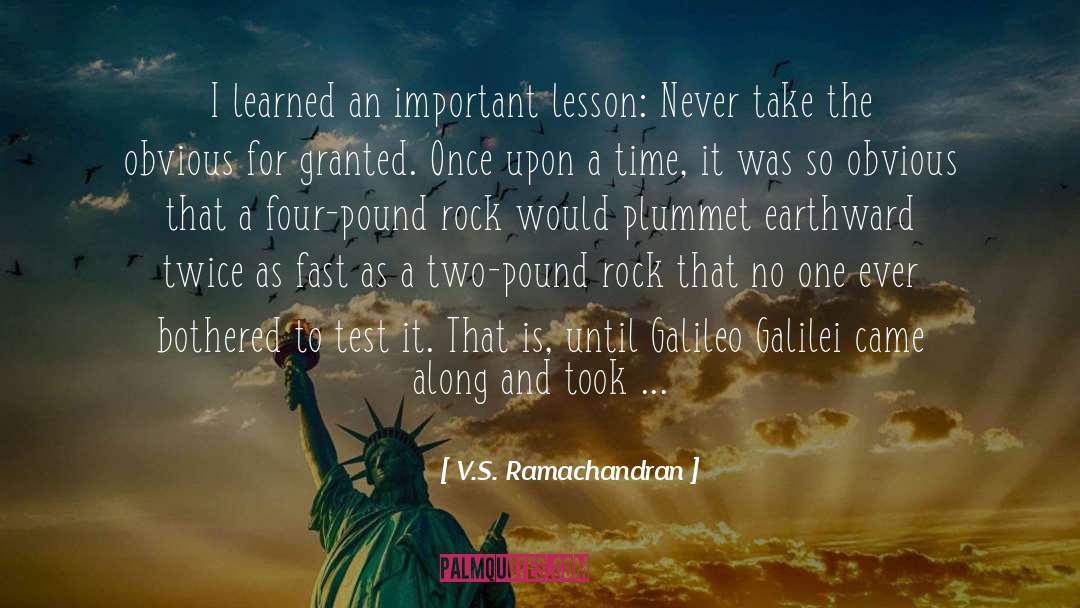
The human brain, it has been said, is the most complexly organised structure in the universe and to appreciate this you just have to look at some numbers. The brain is made up of one hundred billion nerve cells or "neurons" which is the basic structural and functional units of the nervous system. Each neuron makes something like a thousand to ten thousand contacts with other neurons and these points of contact are called synapses where exchange of information occurs. And based on this information, someone has calculated that the number of possible permutations and combinations of brain activity, in other words the numbers of brain states, exceeds the number of elementary particles in the known universe.
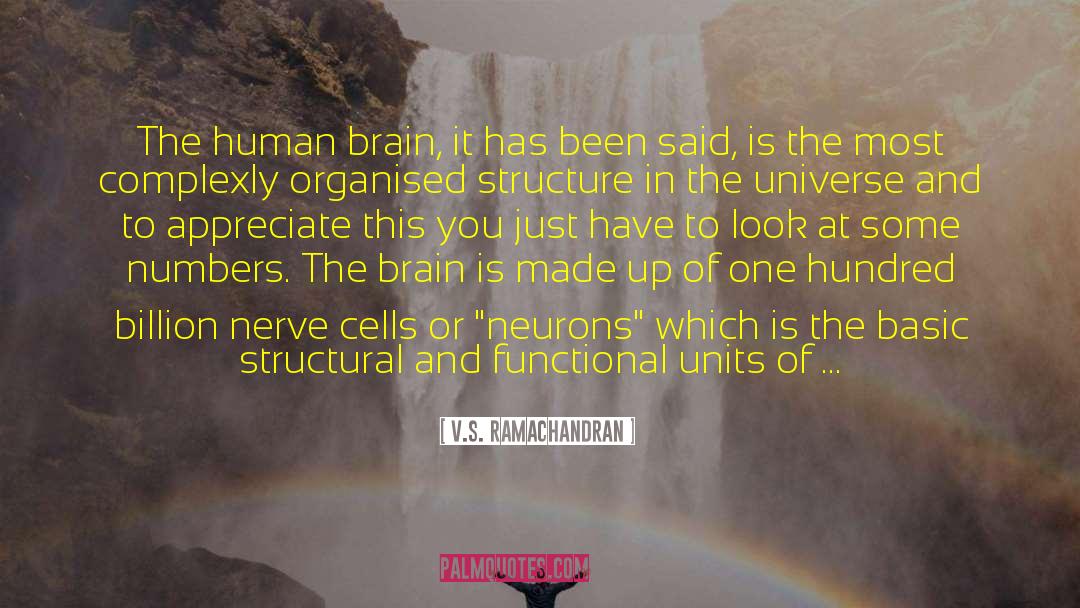
Science should be question driven, not methodology driven.
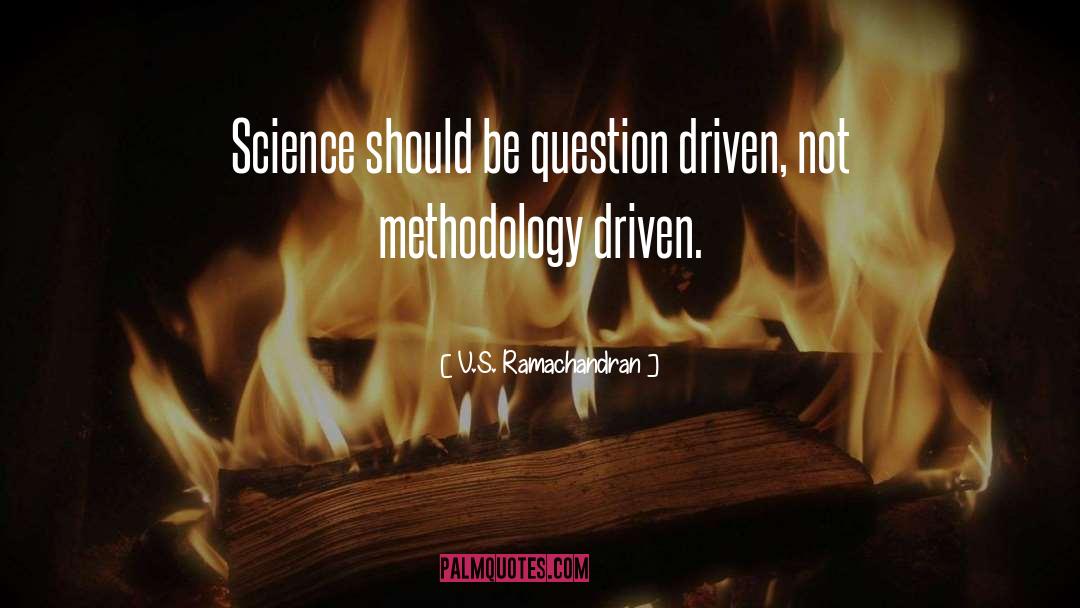
How can a three-pound mass of jelly that you can hold in your palm imagine angels, contemplate the meaning of infinity, and even question its own place in the cosmos? Especially awe inspiring is the fact that any single brain, including yours, is made up of atoms that were forged in the hearts of countless, far-flung stars billions of years ago. These particles drifted for eons and light-years until gravity and change brought them together here, now. These atoms now form a conglomerate- your brain- that can not only ponder the very stars that gave it birth but can also think about its own ability to think and wonder about its own ability to wonder. With the arrival of humans, it has been said, the universe has suddenly become conscious of itself. This, truly, it the greatest mystery of all.
